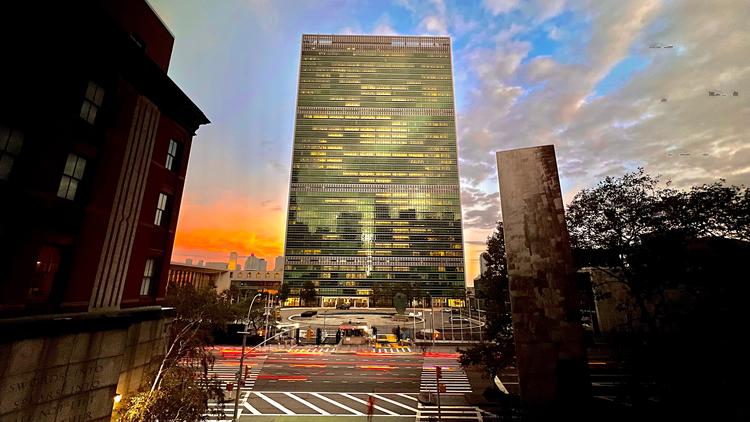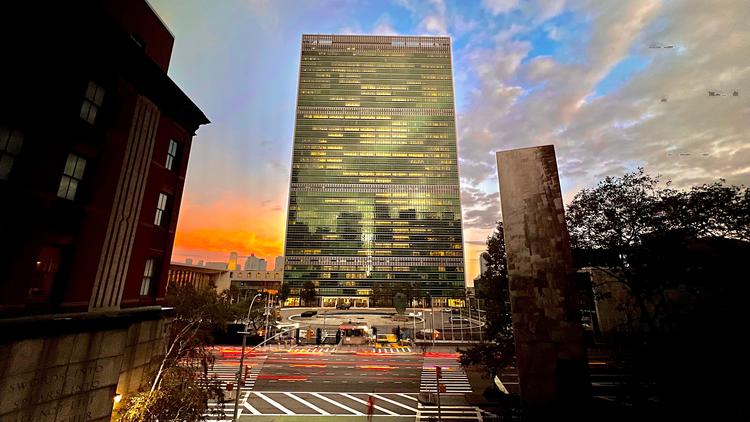Washington, D.C. (Special to Informed Comment) – In the midst of the post-October 7 war in Gaza, President Biden summarized basic administration markers and policy positions for dealing with the Palestinian-Israeli conflict. The president’s views, as presented in the November 19 Washington Post — some also before and since the nineteenth — include:
- The Palestinian people deserve a state of their own.
- The US goal should not be simply to end the conflict in Gaza but to “break the cycle of unceasing violence, and build something stronger in Gaza and across the Middle East.”
- A two-state solution in the only way to ensure the long-term security of both the Israeli and Palestinian people, and the post-October crisis has made it more imperative than ever.
- This is where the road to peace must lead, and this work must start now.
- Gaza must never again be used as a platform for terrorism.
- There must be no forcible displacement of Palestinians from Gaza, no reoccupation, no siege or blockade, and no reduction in territory. Gaza and the West Bank should be reunited under a single government structure.
- Extremist violence against Palestinians in the West Bank must stop. Those committing the violence must be held accountable; and the US is prepared to take its own steps against extremists attacking civilians in the West Bank.
- The international community must commit resources, including security measures, to support the people of Gaza.
- Enormous progress can come out of great tragedy and upheaval.
- Now is when clear vision, big ideas and political courage are needed most.
* * *
Notwithstanding understandable skepticism as to the likelihood of their implementation given the history of the conflict, these principles and positions are imminently sensible and achievable. But it will take hard work and a concerted effort.
The results of US efforts to resolve the conflict have been decidedly mixed, especially in recent decades, and, unlike other potential actors outside the region, Washington does not have relations with key players such as Iran and has only limited contacts with groups such as Hamas and Hezbolllah. Still, the US also has at times had significant success in this area, most prominently the groundbreaking peace between Egypt and Israel. And it would be appropriate for it to again take the lead in realizing a durable peace between Israel and the Palestinians.
However, the effort must not be open-ended. If, after a reasonable time, perhaps six months or a year, it becomes clear that substantial progress toward the ultimate goal is unlikely to be achieved in this manner, then a different approach should be adopted, despite the preferences of one side or another.
This approach should be an international one, with the five permanent members of the United Nations Security Council in the lead. All five have significant stakes in peace and stability in the region.
Russia has long been involved in the region. As the Soviet Union, it voted for the United Nations Partition Plan for Palestine in 1947, and was the first state to recognize the Israeli state de jure three days after its Declaration of Independence on May 17, 1948.
Golda Meir served as Israel’s ambassador to the Soviet Union beginning in September 1948; and, despite worsening relations, the USSR remained mostly neutral in the Arab-Israeli dispute until 1954. It adopted a clear position of support for the Arab states against Israel beginning in 1955 and severed relations in June 1967 in protest of Israeli policy during the Six-Day War and immediately afterward.
Beginning in the mid-eighties, non-diplomatic contacts intensified, and the two sides resumed diplomatic relations in October 1991. The relationship substantially began to improve in 2000 with the election of Vladimir Putin, and in 2001, with the election of Prime Minister Ariel Sharon, who in 2003 described Putin as “a true friend of Israel.” Relations between Israel and Russia further improved after the Russian military intervention in Syria in September 2015.

Photo by Terry Mosley on Unsplash
Putin and Israeli Prime Minister Benjamin Netanyahu have had a close relationship. They have met frequently, with Putin visiting Israel in January 2020 and attending events marking the 75th anniversary of the liberation of the Auschwitz concentration camp by the Soviet Army and International Holocaust Remembrance Day. (He also travelled to Bethlehem for talks with Palestinian President Mahmoud Abbas.) More recently, Israeli-Russian relations have cooled somewhat in part due to Russia’s posture on Hamas’ October 7 attack on Israel and Israel’s response.
Russian is the third-most widely spoken first language in Israel after Hebrew and Arabic. Over 100,000 Israeli citizens live in Russia, while hundreds of thousands of Russian citizens live in Israel. Eight of the hostages taken by Hamas on October 7 are Israelis of Russian background. Three have been released.
Like China, Russia has relations and maintains contacts with all the states and many of the groups in the area, including Iran, Hamas and Hezbollah. Many Palestinians have studied in the Soviet Union and Russia, and the Kremlin hosted a Hamas delegation at the end of October. It also has been a member of the Quartet on the Middle East formed in 2002 to help mediate the Israeli-Palestinian peace process. The other members of the Quartet are the United Nations, the United States, and the European Union.
China is a relatively new player in this sphere, and its position in the region has been generally modest but growing. Beijing is taking more interest in the conflict, increasingly casting itself as eager for peace and capable of brokering a cease-fire after it established diplomatic relations with Israel in 1992 following the dissolution of the Soviet Union. In this period, China and Israel have developed increasingly close economic, military and technological links. China is Israel’s third largest trading partner globally and largest trading partner in East Asia.
In May, 2021 Chinese State Councilor and Foreign Minister Wang Yi stressed the need for humanitarian aid, the lifting of the blockade of Gaza, and international support for a “two-state solution” that included “a fully sovereign and independent Palestinian state, with East Jerusalem as the capital.’
Wang’s comments were essentially a restatement of the four-point proposal made by President Xi Jinping in 2017, which built on the four-point plan for peace offered by Xi to Palestinian leader Mahmoud Abbas in 2013 and is consistent with China’s stance toward the Israel-Palestine conflict since the early 1990s. The three versions endorse the international consensus that calls for a two-state solution based on the 1967 borders, condemns human rights violations and aggression on both sides, and calls for mediated negotiations.
China’s role in orchestrating a rapprochement between Saudi Arabia and Iran in March 2023 raised its profile in the area. Several months later, during a visit by Palestinian President Mahmoud Abbas, the Chinese leader and Abbas agreed to establish a strategic partnership, and Xi reiterated Beijing’s call for the creation of an independent Palestine on the basis of the 1967 borders and increased development and humanitarian assistance to Palestinians. Xi also called for the Palestinian territory to become a “full member” of the United Nations, proposed “a more authoritative and more influential international peace conference” on the Israeli-Palestinian conflict, and said China was willing to “play an active role” in facilitating peace talks over the Palestinian issue,
France and Great Britain have both had a close relationship with the Middle East since the aftermath of World War I when the Ottoman empire collapsed and the League of Nations granted the French a Mandate for Syria and Lebanon, and the British a Mandate for Mesopotamia (later Iraq) and Palestine, later divided into Mandatory Palestine and the Emirate of Transjordan. More recently, both have been the object of large-scale immigration from the Middle East and the victims of terror emanating from region.
Both countries’ positions on the conflict closely align with those of the US.
* * *
The US will not be enthusiastic about sharing the lead with the other UN Security Council veto-wielding members, and Israeli opposition to this approach can be expected. However, in the face of rising influence in the region by China and Russia, Washington would be hard-pressed to avoid such an arrangement. Working together, and factoring in the Saudi Peace Initiative endorsed by the Arab League in 2002 and re-endorsed at the 2007 and at the 2017 Arab League summits, the Five would be in a strong position to coax and pressure both the Israelis and the Palestinians to make the tough decisions to reach peace. Neither side will be totally happy with the result, but they and the rest of the world would be better off for it.
Thus, the Five would be key players in resolving a conflict which began with the UN’s deep involvement in Israel’s creation.



 © 2025 All Rights Reserved
© 2025 All Rights Reserved